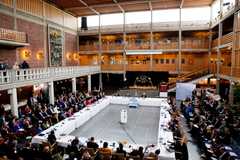Arctic Council / Global
High summit
The Arctic Council has a somewhat informal approach to politics, but the challenges it faces are very real. Monocle joins a meeting and asks two foreign ministers how they balance economic and environmental interests.
The Statler and Waldorf of Arctic politics are trying to find a diplomatic way of describing the events of the night before. Swedish foreign minister, Carl Bildt, and his Norwegian counterpart, Espen Barth Eide, had a private dinner with their fellow Arctic ministers but the morning after there are rumours of raised voices and rather a lot of swearing. Over Swedish coffee the next morning the pair give monocle a flavour of the discussion.
BILDT: I mean, back and forth, can be said; isn’t that the way of phrasing it diplomatically? Back and forth.
EIDE: I think frank and open…
BILDT: Frank and open, back and forth, lively, intense…yeah.
EIDE: Creative.
BILDT: Yeah, creative.
EIDE: Well, bordering on a bit destructive…
BILDT: But after midnight…
EIDE: From midnight it was creative.
The drink-fuelled dinner and the relaxed refusal to hide the evidence of an argument says a lot about the way the Arctic Council works. The issues may be serious but the atmosphere is relaxed, typified by the knitwear Bildt and Eide have chosen to wear. The dress code for the ministerial meeting in Kiruna, the northernmost town in Sweden, is “Arctic Casual” – a phrase that perfectly sums up the way the summit operates. Decisions are made by consensus, hence the late-night, four-letter-infused debate.
For a meeting of seven foreign ministers, including the US secretary of state John Kerry, there is a refreshingly calm approach to personal security. Hours before the summit begins, anyone can come and go from the unpretentious four-storey town hall. Cars park right outside; officials wander in and out. If there is a police presence it is well hidden.
At times, Kiruna can feel like the set of a particularly disturbing Swedish horror film. The quiet side roads, next to thick woodland, are covered in a thick layer of snow. The fog falls suddenly. The hills and the mine, visible on the other side of the road moments ago, disappear.
Weak yellow lights appear in the middle distance, a car slowly navigating its way through the haze.
A middle-aged woman, blonde and wrapped in Gore-Tex, emerges five feet away with a husky. This is not the sort of place one would expect to host a major political summit.
The politics may be informal but the challenges are very real. The melting of the Arctic ice caps has dramatically changed the High North. Ships can now pass through the Northern Sea Route, travelling from Asia to Europe without going through the Suez Canal.
The possibility of drilling for oil and minerals has attracted investors and worried environmentalists. There is, at times, a disconnect between the indigenous groups who live in the Arctic and the politicians around the dinner table deciding their future. At the summit, China, Japan, Korea and Singapore all become official observers, underlining the importance the rest of the world now places on the Arctic.
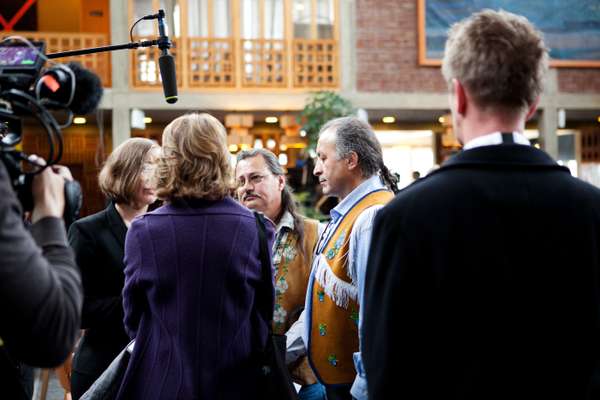
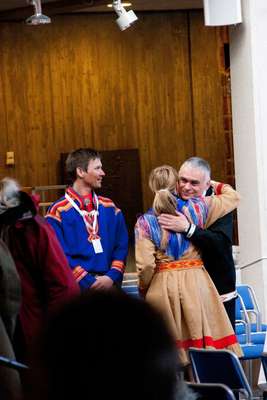
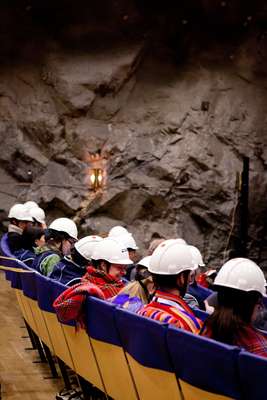

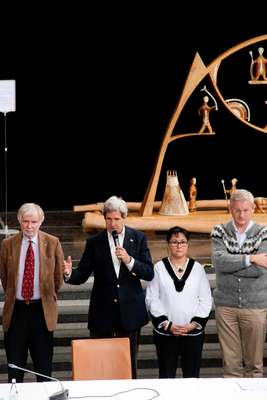
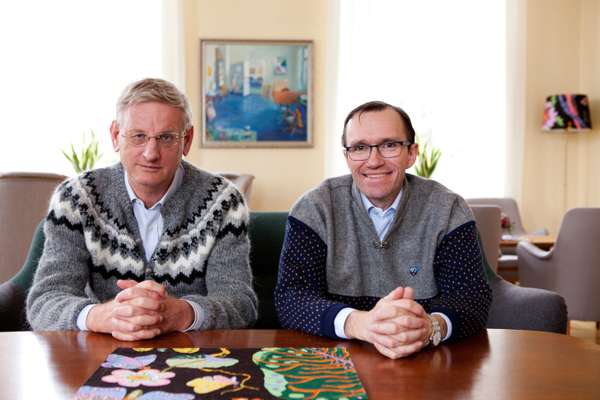
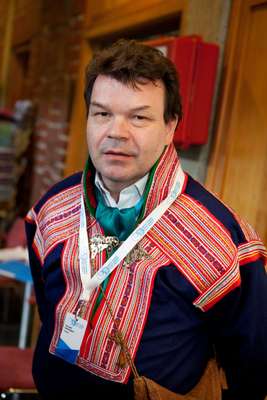
As the number of players grows – even if they’re sat at the back of the room – the fear is that the voices of those who call the Arctic home will be even harder to hear in future. It is something that Bildt and Eide, in one of his final official visits before losing office in September’s election, are determined to ensure does not happen.
Monocle: One of the big Arctic battles seems to be between the importance of the environment and the importance of the people who live there. Is that fair?
Carl Bildt: Well I wouldn’t say battle but you have to balance these two things. I mean, look here in Kiruna. There were some fairly opposite economic interests up here.
There would have been nothing had it not been for the mining. At the same time, there are some environmental considerations, there are the interests of the reindeer-herding peoples here, and so we see the different interests that need to be balanced.
Espen Barth Eide: We have that discussion in Norway as well because the reindeer-herders need vast areas, much more than other people working in livestock because of the particular nature of what they do – and that conflicts with building more mines and things like that.
Then you have on our side questions about where to drill for oil, and typically you will see more people who live in the region that say, “Let’s drill more,” because it brings service industries there and more work places to the region, and then in the capital far away you’ll have more principled environmental concerns.
CB: And then you go to other countries and there are further views.
EBE: Oh, yes, the farther away you get the stronger the views are.
CB: From some quarters there’s a tendency to see the Arctic as a sort of museum to be preserved. And the indigenous people react quite strongly against that.
EBE: To put it mildly.
CB: Yes. And we want to contribute to the possibility of them living decent lives up here as well. Not living in a museum.
EBE: One of the many arguments for opening up the new observers is that people are not only observing the Arctic process but the political process in general.
And I think it’s good for some of the people who are becoming observers to be at a forum where an organisation for Inuits and Samis are actually at the table and are involved in decision making. That should be inspiring.
Monocle: Are you at all wary of China’s interest in the Arctic?
CB: Not really. What happens in the northern polar areas sweeps down over Siberia, and does affect economic conditions in China. They’re investing quite a lot in research. They have the world’s largest commercial icebreaker which was up at the North Pole for the first time last year and they’ve opened up a research station in Svalbard.
Then they have some forecasts for how much shipping they think will be possible up there in the next 20 or 30 years.
Monocle: How does the fact you operate by consensus affect decision making?
CB: We know each other fairly well. That has to be said. This is a small gathering of people who have met before and we can be very open. Then personalities come into the picture as well…
EBE: Formally, any contributor can say “No” or “nyet” or “ne”, or whatever, and block it and walk away. But you don’t do that. You know, you try. And everybody is in this group in order to try and find a solution.
CB: As Espen said, at the end of the day, you find some sort of consensus that everyone, for a start, is prepared to live with, but for the most part everyone is very happy with.
The big elephant in the room is of course Russia. Russia is 40, 45 per cent of the Arctic in every single way – in terms of population, economic impact, property, and in military significance probably even larger. And they also have perhaps a slightly different political mentality than the rest of us sometimes. And an amount of tension is created by that. But all of this being said, it works.
We sit around the table and discuss as equals, whether it’s small Iceland or big Russia. And that’s rather unique. And that’s because we focus on issues on which, at the end of the day, we have a common interest.

